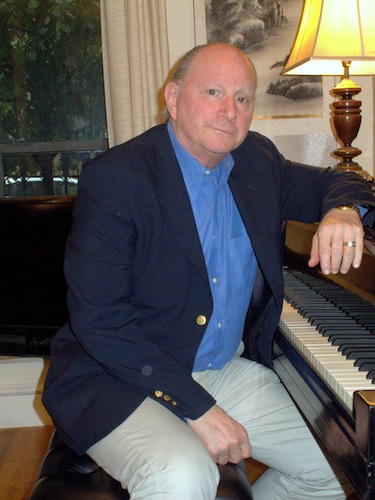Jerome Rose opens International Keyboard Festival with a night of fantasy

Jerome Rose opened the International Keyboard Institute and Festival Sunday night at Hunter College.
It was time to put away the plaster busts of Beethoven, Schumann and Liszt Sunday night at Hunter College’s Kaye Playhouse, as pianist Jerome Rose demonstrated what loose cannons those canonical composers really were.
How better to kick off the 20th annual International Keyboard Institute and Festival—two intense weeks of recitals, master classes and lectures about the piano—than with a program of piano pieces that dared all in their day, and still challenge the understanding of performer and listener alike?
Rose, the festival’s founder and director, sailed with abandon into the opening Vivace, ma non troppo of Beethoven’s Sonata No. 30 in E major, Op. 109. The forward momentum was indeed almost troppo, but in spite of that the pianist showed a keen sense of every flit and twist in this volatile music.
In contrast, the ensuing Prestissimo, a biting parody of the sonata’s tender opening theme, seems to call for a mercilessly strict tempo. On Sunday, the spurts and fluctuations of the Vivace seemed to bleed over into it, causing a somewhat blurry performance.
There were no such issues, however, with the great closing movement, which packs a world of expression into its noble theme and just six variations. In this performance, one wished the theme would sing out a bit more, but the variations were finely characterized, from the ornate soprano aria of No. 1 to the blossoming of ecstatic trills in No. 6.
Rose’s broad tonal palette in the variations, from brilliant to mellow to sturdy, served to remind listeners, as this piano festival got under way, how essential touch and tone are to playing the instrument at the highest level.
For volatility, even Beethoven’s Op. 109 takes a back seat to Schumann’s Humoreske in B-flat major, Op. 20. The composer, whose beloved piano cycles such as Papillions and Carnaval can seem like the purest expression of ADHD in music, outdid himself in this piece, seemingly flinging heterogeneous bits of music together in no discernable order. If Schumann hadn’t already used the title “Traumes Wirren” (Dream Confusions) for an earlier piece, it would have suited this one perfectly.
Rose’s response to Schumann’s interpretive challenge was similar to what he did in the Beethoven: press ahead. At the outset, the tempo really was troppo, and Schumann’s brief, bright ideas sped by as if seen from a bullet train. As the piece unfolded, however, the pianist found the right combination of momentum and characterization, and the mood swings—the mingled “humors”—of the Humoreske could be better appreciated.
From the muffled drums of its opening to the exhaustion of passion at its close, Liszt’s “Funérailles” is such a compelling drama that one forgets that it, too, is composed of extremely heterogeneous materials: a wailing dirge, a sensuous love theme, a thrilling battle scene, all tumbling after each other in a tragic procession.
On Sunday, Rose needed no sped-up tempos to engage the listener, relying instead on sonorous crescendo in the funeral march, glowing tone in the erotic interludes, and an edge-of-the-seat rush of octaves as his hero galloped into the fray.
Such a masterpiece, so stirringly delivered, was bound to cast a shadow on its two more lyrical mates from the collection Harmonies poétiques et religieuses. At least “Bénédiction de Dieu dans la solitude,” which preceded “Funérailles” on this program, was made of first-rate materials, attractively set. Rose laid it out beautifully, his rubato growing out of the theme’s long expressive arc, the chords big and round, the filigree liquid.
“Cantique d’amour” (Hymn of Love), the closing piece in both Liszt’s collection and Sunday’s program, was yet another Lisztian effort to bridge the sacred and the profane, in the prolix, frothy style to which this composer sometimes resorted when inspiration flagged. It at least brought Sunday’s recital in for a safe, soft landing.
Not content to leave it there, Rose returned with a brilliant encore, Liszt’s Hungarian Rhapsody No. 1 in C-sharp minor, delivered with plenty of soul in the mournful recitative and fire in the frenzied conclusion.
The International Keyboard Institute and Festival continues through July 29 at two Hunter College venues. Pianist Alyosha Jurinic performs music of Schubert, Schumann and Liszt 5 p.m. Monday in Lang Recital Hall, and Claire Huangci plays Scarlatti and Chopin 8 p.m. Monday in the Kaye Playhouse. ikif.org; 212-772-4448.


